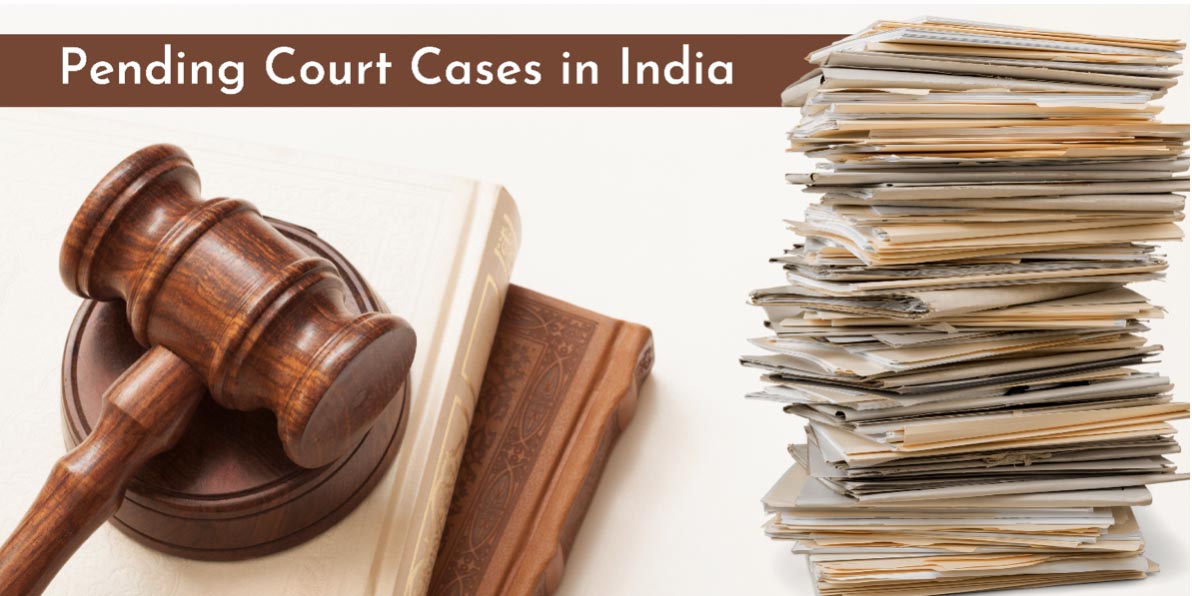American philosopher Jerome Frank very well said that “the courts belong to the citizens in a democracy and not to the lawyers and judges”. The Constitution of India guarantees social, political and economic justice to the denizens of the country; however, it is a matter of utter shame that even after 74 years of independence, there are most of the people, who are far behind the reach of the so-called Justice. There is a huge pendency of cases over 45 million across all the courts in India which tends to show the problem of inefficiency and intensity of flaws that our judicial system is facing. There are cases in India that are pending for more than 30 years. The time period between filing of a case and its disposal completes the life span of an aggrieved party. In fact, this is a common perception in India that civil cases pass from one generation to another as “hierarchy gift”. The story does not end here, when the judiciary fails to dispose of the pending cases promptly, the same leads to interference with the socio-economic development of the country and defeats the idea of providing expeditious and inexpensive justice to the needy.
“Speedy Trial” a Fundamental Right
Article 21 of the Constitution of India explicitly states that Speedy Trail is a fundamental right of life and personal liberty and no one can deny it. It is a right guaranteed for accused persons or prisoners to have their trials concluded swiftly. However, many factors impede the timely resolution of cases and, as a result, cases accumulate in the courts for years. Many under-trials die in prisons awaiting justice. It is the constitutional obligation of the Courts to provide speedy trial for the enforcement of fundamental rights of the accused by directing the state to take necessary steps of investigating, establishing new courts, appointing judges, and all different measures that can ensure the speedy trial in the judicial system.
Even the great judges of India like Hon’ble Mr. Justice Krishna Iyer observed earlier that “our justice system even in grave cases suffers the slow-motion syndrome which is lethal to the fail trail whatever the ultimate decision is. Speedy trail is a component of social justice as the community as a whole is concerned about the criminal being condignly and finally punished within the reasonable time and the innocent being absolved from the inordinate ordeal of criminal proceedings”. Similarly, Hon’ble Mr. Justice P. N. Bhagwati observed that “the state cannot avoid its constitutional obligation of providing speedy justice to the accused by pleading its financial or administrative inability”.
Causes of Pendency
- Inadequacies of judges: This is one of the most important reasons for the pendency of the cases in the Indian judicial system. Recently, the Government of India has increased the strength of judges in the Supreme court from 31 to 34. At the present time the working strength of the Supreme Court is 32 and there are two vacant places. However, the statistical data by Ministry of law and justice shows that there are 389 vacancies of judges in different High courts of India. The data of vacancies in district court is much higher touching approx. 5000 according to a newspaper report.
- Administrative and Infrastructural flaws in Courts: It is also one of the vital factors responsible for the arrears of cases. Most of the subordinate courts in India lack proper infrastructure. Poor infrastructure, lack of internet, computer system, and lack of skilled staffs contributes to the aforesaid problem. There are not even enough court rooms to occupy the judges in case if the new appointments are made.
- Insufficient number of Courts. The inadequacy in the number of subordinate courts is also a reason for the delay in the disposal of cases. With the advancement of technology and science the new type of crime called cybercrime has increased these days. Nevertheless the metropolitan cities are equipped with special courts with technically abled manpower but in the rural areas there is a lack of such courts.
- Abuse of Public Interest Litigation Mechanism: The High Courts and the Supreme Court have been flooded with Public Interest Litigation matters. The frivolous filing of PIL for publicity private interest and political rivalry amounts to its misuse. The Apex Court has shown its serious concern time to time in regard with the misuse of PIL.
- Burden of government cases: There is a bundle of cases in the courts where the government are responsible for the arrears of such cases. Statistics provided by Legal information management and briefing system (LIMBS) shows that the centre and the states are responsible for the 46% of the pending cases in India.
- Advancement in Socio-economic conditions of a common man: The socio-economic advancement and the increase in awareness of legal rights between the common man has led the people come out for their rights. The common man of the rural areas who were unaware about their legal rights including fundamental right didn’t approach courts for their rights. The Government institutions, NGO reached rural areas and make the people aware about their legal rights which led the increase in the number of cases in the district courts. However, the pathetic situations of the sub-divisional as well district courts remained the same.
- Frequent adjournments: The issue of unnecessary adjournments is a reason for the delay in case. The 77th law commission report reflects such issue. The workload on the police administration leads to the frequent adjournments in the cases.
- Delay in investigation: According to the provisions of code of criminal procedure the FIR is registered in the cognizable cases. Further, the Investigation officer investigates the cognizable offences. The trial of the case depends on the time Investigation officer takes to furnish the Investigation report (Charge sheet) before the magistrate. So the IO plays an important role in disposal of matters. The delay in the investigation or negligence behaviour amounts to the delay in the procedure.
Justice delayed is Justice denied
Pendency of cases in Indian Judicial System is a huge challenge. About 4.5 Crores cases are pending before all levels of judiciary- Supreme Court, High Courts and the Subordinate Courts which leads to a situation of “Justice Delayed is Justice Denied”.
Martin Luthur King Jr. had said that “Injustice anywhere is a threat to Justice everywhere” and the delay in the justice amounts to the denial of justice. The huge pendency of cases in our judicial system tends to provide the same as asserted above. Judiciary is the wing of the State and hence, if the proper working of judicial system comes under threat it is onus of the State to remove flaws of the mechanism so that timely Justice to every section of the society could not be hampered. There are different advisory bodies like Law Commission which provide suggestions time to time in order to fix the bugs created in the judicial system. The Government, Bar including Bench should also come up with proactive approach to deal with arrears of the cases so that the institutions can work smoothly accessing its aim on top threshold.
Blog by Indian Lawyers Association

